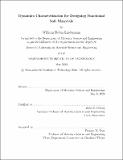| dc.contributor.advisor | Julia H. Ortony. | en_US |
| dc.contributor.author | Lindemann, William Robin. | en_US |
| dc.contributor.other | Massachusetts Institute of Technology. Department of Materials Science and Engineering. | en_US |
| dc.date.accessioned | 2020-10-08T21:29:45Z | |
| dc.date.available | 2020-10-08T21:29:45Z | |
| dc.date.copyright | 2020 | en_US |
| dc.date.issued | 2020 | en_US |
| dc.identifier.uri | https://hdl.handle.net/1721.1/127906 | |
| dc.description | Thesis: Ph. D., Massachusetts Institute of Technology, Department of Materials Science and Engineering, May, 2020 | en_US |
| dc.description | Cataloged from the official PDF of thesis. | en_US |
| dc.description | Includes bibliographical references (pages 161-179). | en_US |
| dc.description.abstract | In solutions, the dynamic behavior of soft materials is often critical to their function. In biological materials such as proteins and peptides, the edict that 'structure dictates function' has been supplanted in recent decades by recognition that features like intrinsic disorder, conformational distribution, and solvent dynamics often play a part which is equally fundamental to the binding and reactivity of these materials. The same revelation holds for many other functional soft materials, including abiotic peptides and self-assembling materials, where function is controlled by the dynamic behavior of both the compound and the substrate. In this work, I elucidate the role of dynamics in several significant functional polyamides by the synthesis and characterization of samples spin-labeled for electron paramagnetic resonance (EPR) spectroscopy. By this approach, I developed insight into several soft-materials systems, including abiotic peptide tags, combinatorially selected for bioconjugation; fibronectin mimetic peptides, designed for therapeutic purposes, biomaterials and drug delivery; and finally, novel, self-assembling polyamide materials designed for water purification and energy conservation. | en_US |
| dc.description.statementofresponsibility | by William Robin Lindemann. | en_US |
| dc.format.extent | 179 pages | en_US |
| dc.language.iso | eng | en_US |
| dc.publisher | Massachusetts Institute of Technology | en_US |
| dc.rights | MIT theses may be protected by copyright. Please reuse MIT thesis content according to the MIT Libraries Permissions Policy, which is available through the URL provided. | en_US |
| dc.rights.uri | http://dspace.mit.edu/handle/1721.1/7582 | en_US |
| dc.subject | Materials Science and Engineering. | en_US |
| dc.title | Dynamics characterization for designing functional soft materials | en_US |
| dc.type | Thesis | en_US |
| dc.description.degree | Ph. D. | en_US |
| dc.contributor.department | Massachusetts Institute of Technology. Department of Materials Science and Engineering | en_US |
| dc.identifier.oclc | 1197629010 | en_US |
| dc.description.collection | Ph.D. Massachusetts Institute of Technology, Department of Materials Science and Engineering | en_US |
| dspace.imported | 2020-10-08T21:29:44Z | en_US |
| mit.thesis.degree | Doctoral | en_US |
| mit.thesis.department | MatSci | en_US |
